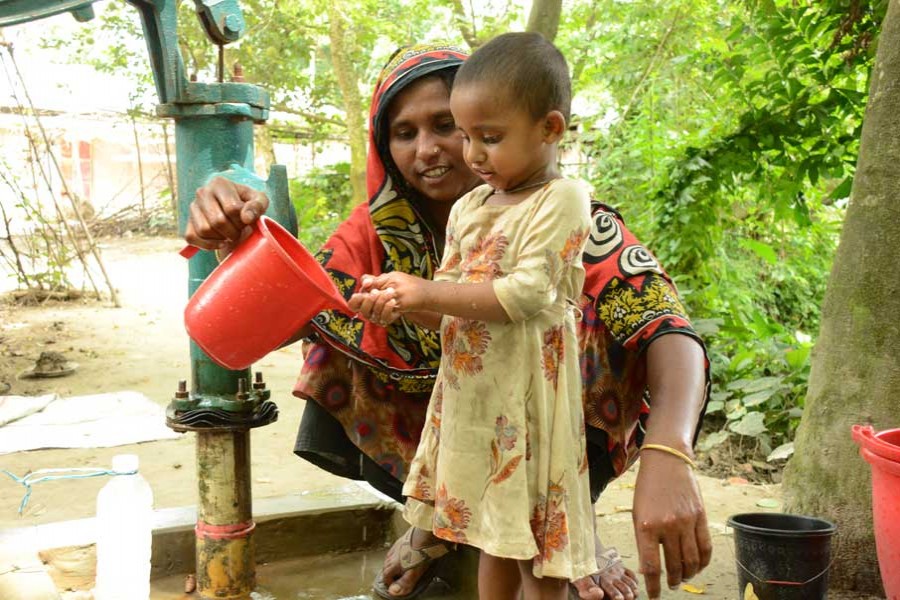Scientists have discovered that improving water, sanitation and hygiene in resource poor settings of Bangladesh have helped to better overall health conditions of the inhabitants living in those areas.
But, contrary to expectations, these did not improve children's growth and development, said the icddr,b on Tuesday sharing the findings.
Despite mounting research over the last decade linking poor sanitation to stunted growth in children, a new study found that children born into housing compounds with improvements in drinking water quality, sanitation and hand-washing infrastructure were not measurably taller after two years compared to those born into compounds with more contamination - although children who received the interventions were significantly healthier overall.
The WASH Benefits Bangladesh trial, led by Stanford epidemiologist Dr Stephen Luby, is one of the first to examine what are known as water, sanitation and hygiene (WASH) interventions as a way of improving children's growth in low-income communities, reports UNB.
How well a child grows in the first year can indicate overall wellbeing and is linked to both survival and brain development.
These WASH interventions have been proposed as a way of improving child growth and are being implemented in many communities around the world, but haven't been rigorously tested.
Commenting on the efficacy of WASH interventions in improving stunted growth Dr Luby said, "Part of what we learned is that this problem of stunting is not going to be easily fixed by a little bit of attention to water, sanitation and hygiene.
Modest efforts to marginally improve environments are not going to be sufficient. "If we want children in the lowest-income, most resource-constrained environments to thrive, we're going to need to make their environments radically cleaner."
Children in the Bangladesh trial who received nutritional supplements in addition to WASH interventions did grow taller and were less likely to die, but WASH interventions alone did not improve growth.
The study, published on Monday in The Lancet Global Health, examined the health and growth of children from over 5,000 pregnant women in rural Bangladesh after two years.
The mothers were grouped according to geographic clusters and randomly assigned to one of six interventions or acontrol group.
After two years, nearly all the interventions reduced diarrhoea. Although expected, the result is important because it suggests that families did adhere to the interventions.
It also creates hope that WASH interventions could beat back one of the greatest killers of children globally - the World Health Organisation estimates 361,000 children under five years of age die as a result of diarrhoea each year.
Of all the interventions, providing nutritional supplements in addition to combined water, sanitation and hand washing interventions had the greatest effect on curbing mortality in addition to improving growth.
Children receiving this intervention were 38 per cent less likely to die compared to children in the control group.
Past research has shown that WASH strategies are effective at reducing diarrhoea and improving child health, Dr. Luby said, but evidence of the impact of these strategies on child growth and development has been sparse.
In response to this lack of data, Dr. Luby began laying the groundwork for the current study more than a decade ago.
One of his concerns was ensuring the group developed a rigorous and transparent trial design that included close community partnerships and innovative ways of encouraging village residents to adopt new behaviours.
Unless most people in the community adopted the interventions, he knew the results would not be conclusive.
With the large number of children in the study, good adoption of the interventions and careful design, the study had the statistical power to detect small effects. Thus, Dr. Luby noted the absence of growth improvement with WASH interventions was genuine.
Commenting on the findings, Dr Md. Mahbubur Rahman, icddr,b principal investigator of the study in Bangladesh, said, "It was shown again that conventional WASH intervention strategies are insufficient to improve stunting in children living in water, sanitation and hygiene compromised settings."
He feels it is the time to think about more comprehensive strategies for WASH interventions that can better ensure clean and safe environments for growing children.
Dr Rahman, who also leads the environmental health & interventions unit at icddr,b as a project coordinator, recommends that future studies need to examine ways to reduce children's exposure to faecal contamination in and around the home.
"We also need to learn how to effectively integrate these WASH interventions with other interventions for maternal and child health nutrition, and psychosocial stimulation to product the very best outcomes for our children," he adds.


